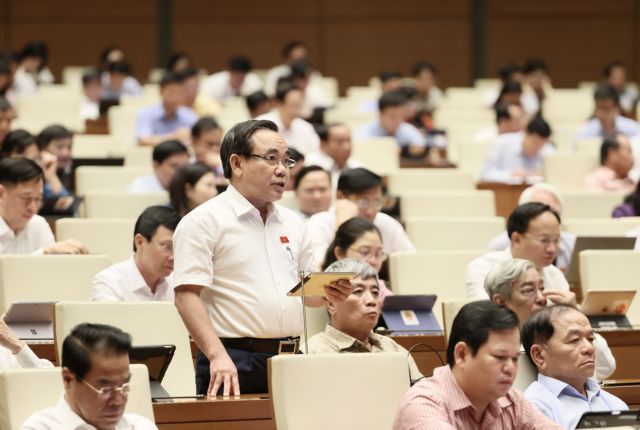 Politics & Law
Politics & Law


|
| Deputy Lê Hữu Trí from Khánh Hòa at the session discussing amended Land Law on Wednesday in Hà Nội. VNA/VNS Photo Dương Giang |
HÀ NỘI — Land acquisition for the purpose of socio-economic development must be transparent and fair to the people, according to National Assembly deputies at a whole-day session discussing the amended Land Law on Wednesday.
The deputies agreed that land use planning is a very important content and is reflected throughout the draft Law. Therefore, it is necessary to carefully evaluate to make appropriate adjustments to serve socio-economic development and ensure effective management and use of land.
Deputy Tô Văn Tám of Kon Tum Province said it is necessary to separate the regulations on land acquisition for public purposes and land acquisition for commercial purposes.
Citing Resolution 18-NQ/TW on improvement in regulatory institutions and management and use of land, he said it is necessary to continue implementing the self-agreement mechanism between people and businesses in the transfer of land use rights to implement urban and commercial housing projects.
However, the regulations on land acquisition, compensation and support when recovering land in the draft law still do not clearly show this spirit, and there are many contents that are not favourable for people, he said at the fifth plenary session of the 15th National Assembly in Hà Nội.
It is important to have separate regulations on land acquisition for different purposes.
In case it is for the national/public purpose, the state will have compensation in accordance with the draft law and have more policies to encourage people to give their land.
"There are many people who voluntarily donate land to build roads, bridges and schools without asking for compensation at all, the State needs more policies to encourage this," Tám said.
In the case of land acquisition for commercial purposes that are purely for profit, Tám suggested that it should be regulated in accordance with Resolution 18 which highlighted the agreement (among stakeholders).
In case no agreement can be reached, the parties may request an independent valuation agency.
"If no agreement can be reached at this stage, we can ask the court to settle it," he said.
Sharing the same view, deputy Lê Hữu Trí from Khánh Hòa said that although the draft law has tried to specify a list of projects that the State recovers land for socio-economic development, for the national and public interest, it is not possible to list all the projects that will arise in the future.
He suggested that it is necessary to design another regulation to handle in case a project for socio-economic development and/or for the national and/or public interest, is not included in the list mentioned in the law.
Trí said there are issues that are not clearly regulated in the 2013 Land Law, leading to many violations. In some cases, land which is supposed to be acquired for public purposes is taken for commercial purposes to benefit investors and businesses.
With regards to compensation and relocation, deputy Nguyễn Quang Huân said the regulations in the draft law should take into account not only incomes but also the lives and livelihoods and other factors of relocated households.
Discussing principles and methods of land valuation, deputy Phan Thị Mỹ Dung from Long An Province said that it is necessary to abide by market-based principles to ensure harmony of interests of the State, land users and investors.
Deputies noted that the issues with land compensation lie not only in calculating compensation but also in ensuring resettlement for affected people. This is to ensure the quality of their new place is equal to or better than the old one.
The draft Land Law has 16 chapters and 263 articles with five more items, 40 new articles added, 13 articles removed compared to the draft for public opinion.
The draft law incorporates revisions of regulations related to land acquisition, specification of cases where land is acquired to serve defence and security purposes, as well as regulations on compensation, resettlement and land price evaluation. — VNS




